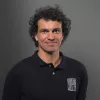Maxime Bellemin has also an idea to reinforce basic skills to access the competition scene (IPPI6 - additional technical layers). I agree pilots could improve their skills a lot (coach cap), however take a look at the fatality list, some of our friends were superstars and accomplished athletes. Thanks for the input
Pilot's technical skills
Just watch the takeoffs during “high-level” competitions. It's disastrous for far too many pilots. The excuse that ballast makes mobility difficult exists. But that doesn't justify pilots not being able to fly their wings properly.
Unfortunately, a pilot who cannot control their wing on the ground will have the same poor reactions in flight. This is dangerous, both for them and for other pilots in a group.
A surprising comparison:
Running is a popular sport, with more and more people running (on roads or trails). The average jogger will train to complete their city's half marathon. They will pay for a coach and invest time and energy in their running.
In contrast, paragliders compete without training. They do so without thinking about their current level, their progress, or how to train to reach the level required for competition. Unlike running, paragliding puts our lives at risk. This happens at all levels, even in a final round of an FAI 1 championship... And yet, are they “the best in the world”?
An athlete is someone who thinks about their practice, who takes the time to train, to repeat the basics, to progress... And this applies at all levels.
In parallel with this reflection, why are there far fewer accidents, or even no fatal accidents, in H&F races or acro competitions? Because they train to reach their level.
There has never been a death in the Xalps, even though the commitment is at its peak. Why? Luck? Maybe. But that's not all. These guys work hard to be “ready” for their race. In XC, the guys don't work hard.
- Read more about Pilot's technical skills
- 6 comments
- Log in or register to post comments




Comments
I tend to agree, but apart from the observation, is there any data to support the point?
I’m by no means a role model in this matter and I'd like to train more often.. anyway.
I’d suggest preparing a survey (even though I hate surveys) to collect data such as:
- When was the last time you did a ground handling session with your competition wing?
- How often do you do such sessions?
- When did you last stall your comp glider?
- How often do you train stalls on your comp glider?
- How many practice stalls do you do per year?
- What is the reason you don’t do this more often? (lack of time, laziness, other priorities, finances, logistics, concern about equipment, fear, IMO that's enough, other etc.)
- And as a reference - in which glider class do you compete?
The idea would be to understand the current situation - the issue we’re trying to address - and to get a sense of the trend.
Ideally, such data could be collected annually to see how things evolve over time.